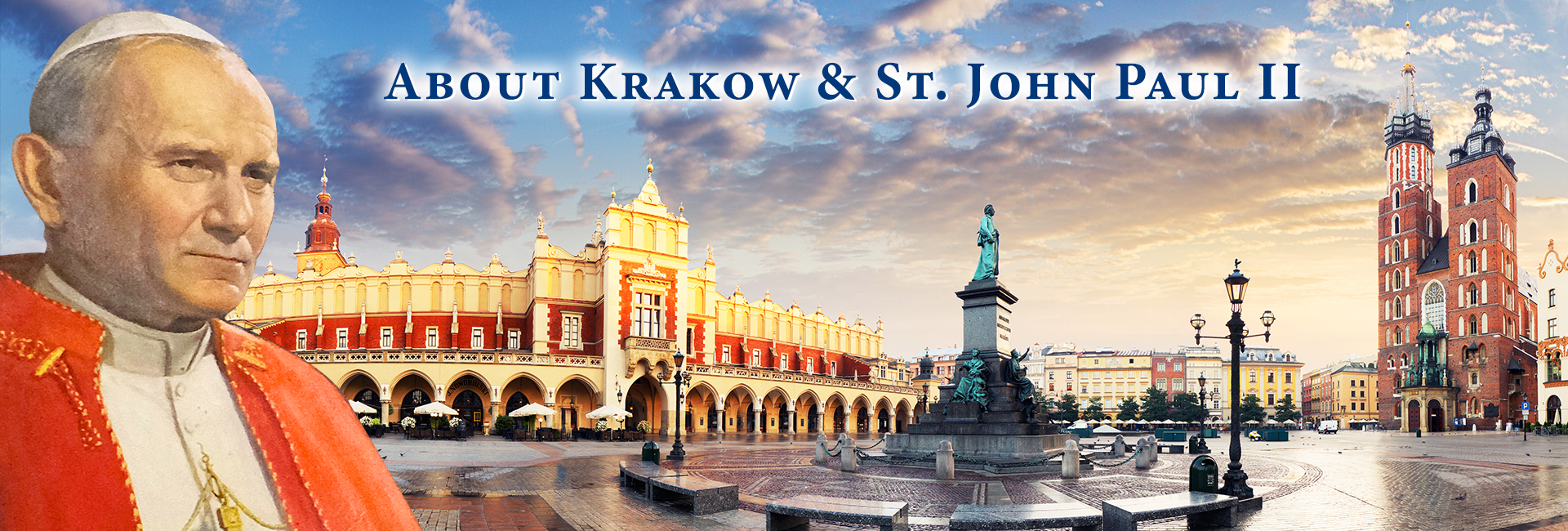
About Krakow & Saint John Paul II
Karol Wojtyla (Saint John Paul II) was born in the Polish town of Wadowice on May 18, 1920. He moved to Krakow with his father in 1938, where he attended Jagiellonian University and began studying for the priesthood. He was ordained as a priest on November 1, 1946 and went on to continue his studies in Rome until 1948. He returned to Poland that same year for his first pastoral assignment in the village of Niegowic, which lasted seven months. He then was transferred to the parish of St. Florian in Krakow, where he also spent time hiking in the mountains and canoeing with young people.
Karol Wojtyla’s personality and ability to connect with young people attracted large crowds to his sermons. He not only had a group of people regularly attend his liturgy at 6:00AM, but also celebrate name-days and travel together to hike the Bieszczady Mountains and canoe on the Masurian Lakes. The group was very close, and referred to Priest Karol as ‘’Wujek,” which is Polish for Uncle.
Karol Wojtyla continued his theological studies, and in 1958 he was nominated Bishop. Soon after, he participated in preparations for the Second Vatican Council. Following the death of Archbishop Eugeniusz Basiak in 1963, he became the Bishop of Krakow and four years later was appointed Cardinal by Pope Paul VI.
Karol Wojtyla was a strong advocate of the youth movement, ‘’Light-Life,” established in 1969 by Fr. Franciszek Blachnicki. He appreciated the importance of the movement and the religious formation offered to young people through the creation of summer camps. Communist authorities saw the camps as alarming, and activists of the movement were persecuted. Many Bishops distanced themselves from the movement out of fear of endangering the Church. As a Cardinal, Karol Wojtyla officially approved the summer camps as part of pastoral activites in the Krakow archbishopric. He often attended meetings with students, preached at retreats, made surprise visits to offer confession, and unofficially supported the programs financially, including giving funds to the poorest students. John Paul II addressed the youth on the inauguration of his pontificate, in his first speech delivered from the window of the Apostolic Palace before the Angelus. He exclaimed, ‘’…my hope, because you are the promise of tomorrow. You are the hope of the Church and society.” Meetings with young people were immensely important for Saint John Paul II, and he is notably behind the creation of World Youth Day.
Saint John Paul II often returned to Wadowice, Niegowic, Krawkow and Zakopane, where his road to the Papacy all began. He recalled on a pilgrimage to his homeland, ‘’Here, in this land, I was born. Here, in Krakow, I spent the greater part of my life… Here, I received the grace of my priestly vocation… I was consecrated Bishop in the Cathedral of Wawel.” Karol Wojtyla’s journey to Rome for the conclave started in Krakow, where he became an adult, an artist, and a devoted shepherd of souls.
After returning from a week long Lenten retreat, he was suffering from the effects of the flu, his condition continued to decline. He continued to resume his usual audiences and visiting with bishops until his condition prompted him to appear via television to Pilgrims. On April 2, 2005, his final hours were filled with uninterrupted prayer by those assisting him, and by thousands filling St. Peter’s Square. His last words, fitting to a life filled with prayer, were ”Amen, Amen”.
His miracle for Beatification came from a french nun, Sister Marie Simon-Pierre, who was struck with Parkinson’s several months after his death. His Beatification Ceremony took place on May 1, 2011, was the biggest event in Rome since his death, and is the quickest of modern times. With over 300,000 attendees, and over 2 million taking part in beatification-related activities. ”It’s not like Karol Wojtyla, John Paul II, will suddenly become a saint when the canonization ceremony occurs. The belief would be he is already in heaven with God, living the life of a saint. All that’s going to happen when the ceremony occurs is that the church will officially recognize that”
– Pope Francis
